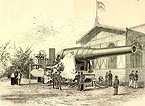Schrift: größer/kleiner
Inhaltsverzeichnis
Sie sind hier: WirRheinländer > english version > Industrialisation > Industrialisation in the Rhine Province
Industrialisation / Proletariat
Industrialisation in the Rhine Province
After exploiting coal reserves by means of deep mineshafts, followed by the introduction of coke furnaces to generate energy, industrialisation came to mean iron and steel production. The coal and steel industry formed the basis for all other industries, including the Ruhr Region, where metal-working industries moved next door.

Duisburg, Essen, Sterkrade, Cologne and Aachen became centres of mechanical engineering. In Cologne, following the ground-breaking invention of the carburettor engine by Nicolaus August Otto in 1867, enterprises emerged such as the Humboldt Institute of Mechanical Engineering, or the Deutz Gas Motor Factory. In Solingen and Remscheid traditional toolmaking and blade manufacturing underwent major growth. The chemical industry also experienced a rapid upturn: e.g. the Bayer company, founded in Barmen, moved to Leverkusen in 1891 and there became one of the most successful companies world-wide, similar to Henkel in Düsseldorf.
The fact that such an enormous economic upswing could take place in the region was also due to those well-known founders of enterprises and industrial pioneers who seized the opportunities of the time and created empires. In the process some of them represented an extreme form of capitalism, while others concerned themselves with the social support of their workers.
The most significant Rhenish businessmen of the nineteenth century included: Friedrich Bayer (1825-1880), chemicals in Barmen; Moritz Böker (1853-1933), iron industry in Remscheid; Carl Duisberg (1861-1935), chemicals in Leverkusen; Franz Carl Guilleaume (1834-1887), cable manufacture in Cologne; Franz Haniel (1779-1868), coal mining and iron & steel industry in Gelsenkirchen and Duisburg; Johann Abraham Henckels (1813-1870), cutlery industry in Solingen; Adolph (1845-1923) and Emil Kirdorf (1847-1938), iron & steel industry, mining in Mettmann, Aachen, Gelsenkirchen; Alfred Krupp (1812-1887), iron and steel industry in Essen; Eugen Langen (1833-1895), sugar industry in Cologne; Reinhard (1856-1922) and Max Mannesmann (1861-1915), iron and steel industry in Remscheid; Gustav Mevissen (1815-1899), mining, iron & steel industry, railway construction, banking in Cologne; Konrad Gustav Pastor (1796-1890), mining, iron & steel industry in Aachen and Belgium; Carl Poensgen (1802-1848), smelting industry in Prüm; Gustav Matthias Stinnes (1826-1878), coal mining, iron smelting, cargo shipping in Duisburg; Carl Theodor Puricelli (1794-1872), Friedrich Puricelli (1792-1880) and Heinrich Puricelli (1797-1876), iron & steel industry in Rheinböllen; Talbot (1829-1899), iron and steel industriy in Aachen; August Thyssen (1842-1926), iron and steel industry in Duisburg. Many of the enterprises founded by these industrialists still continue to exist today, sometimes as mergers (e.g. Thyssen-Krupp) or with an altered product profile (e.g. Stinnes). Others have disappeared as a consequence of the wave of economic concentration since the 1980's, such as Mannesmann after the take-over by the British company Vodafone.
With the economic upturn, energy sources and fast, reliable transport routes became particularly important. At the beginning of the 19th century, the Rhine Province had one of the densest railway networks in the world, as well as good connections via waterways, which underwent further expansion, for example the Dortmund-Ems canal from 1891 to 1899 and the Rhine-Herne canal from 1905 to 1914. Duisburg-Ruhrort had the largest inland harbour in Europe.


